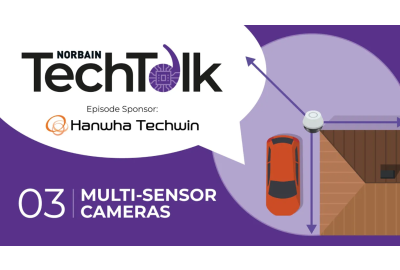A closer look at Hanwha's multi-sensor camrea
Video transcript:
Multi-sensor cameras are fast gaining popularity in the industry,
but what advantages can they offer and where are they being used?
Fundamentally, these cameras offer savings in both time and money for
both the installer and the end user, not just now but in the long term too.
They provide the capabilities of multiple camera sensors in one housing and only
require a single IP connection, so end users normally need to purchase just one VMS licence.
Advances in technology such as more powerful processing chips mean you
can set them up as if they were separate cameras but without the concern about additional costs,
allowing a flexible arrangement for up to full 360 degree coverage.
They make a fantastic addition to your existing portfolio,
and of course, they can see around corners….
There are a few options to choose from,
designed to suit a variety of video surveillance challenges:
Two sensor options will enable you to capture high-definition images of adjacent areas,
so useful on the corner of a building or in a stairwell.
Anywhere you have a L-shaped or 2 angled area that requires coverage.
The addition of a third sensor will allow you
to monitor any blind spot between the other two cameras or sensors.
With four camera sensors, you can customise the angles and zoom settings for each camera
and remove any blind spots, covering a 360 degree view if you need to. For example,
whilst one camera could be set to zoom in on a door, a further two cameras can be programmed
to take a wide-angle view in opposite directions, whilst the fourth camera covers any blind spots.
There are some really clever options on the market too, such as panoramic cameras which
bring together several images, very useful in a busy town centre, stadium or carpark
where safety and security are paramount. They provide superior image quality at a distance,
so are ideal for capturing incidents far away.
And if you add a PTZ camera, you can actually zoom in and track
a moving object or respond to detected activity by any of the other 4 sensors!
As well as the benefit to the customer of only paying for one or two VMS licences whilst gaining
the coverage of multiple camera sensors, for the installer there is a significantly
reduced installation time, reduced cabling, conduit and mounting hardware requirements,
fewer connections to set up and decreased ongoing maintenance obligations.
You can often remotely focus lenses, monitor activity in
real-time and benefit from the advanced analytic capabilities that will ensure
both you and your customer receive better management information.
The multi-sensor camera options available today are ideal for a huge
variety of environments including Manufacturing plants, Distribution Centres and Warehouses,
Stadiums, Carparks, Town and Shopping Centres,
Universities and Hospitals, or outdoor attractions such as zoos and theme parks.
Norbain work with a range of camera manufacturers and are ready to discuss
which Multi-Directional Camera solutions are most suitable for you and your customer’s challenge.
To find out more, why not head to norbain.com or speak with
your account manager.
